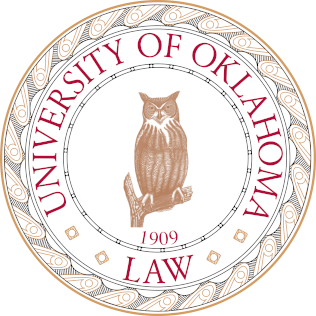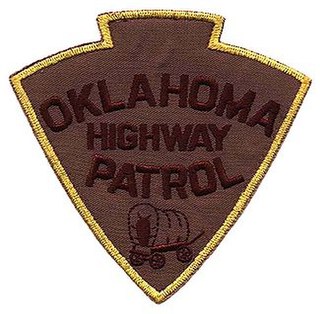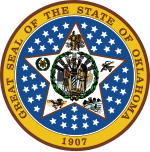
Oklahoma is a state in the South Central region of the United States. It borders Texas to the south and west, Kansas to the north, Missouri to the northeast, Arkansas to the east, New Mexico to the west, and Colorado to the northwest. Partially in the western extreme of the Upland South, it is the 20th-most extensive and the 28th-most populous of the 50 United States. Its residents are known as Oklahomans and its capital and largest city is Oklahoma City. The state's name is derived from the Choctaw words okla, 'people' and humma, which translates as 'red'. Oklahoma is also known informally by its nickname, "The Sooner State", in reference to the Sooners, American settlers who staked their claims in formerly American Indian-owned lands until the Indian Appropriations Act of 1889 authorized the Land Rush of 1889 opening the land to settlement.

Indian Territory and the Indian Territories are terms that generally described an evolving land area set aside by the United States government for the relocation of Native Americans who held original Indian title to their land as an independent nation-state. The concept of an Indian territory was an outcome of the U.S. federal government's 18th- and 19th-century policy of Indian removal. After the American Civil War (1861–1865), the policy of the U.S. government was one of assimilation.

The governor of Oklahoma is the head of government of the U.S. state of Oklahoma. Under the Oklahoma Constitution, the governor serves as the head of the Oklahoma executive branch, of the government of Oklahoma. The governor is the ex officio commander-in-chief of the Oklahoma National Guard when not called into federal use. Despite being an executive branch official, the governor also holds legislative and judicial powers. The governor's responsibilities include making yearly "State of the State" addresses to the Oklahoma Legislature, submitting the annual state budget, ensuring that state laws are enforced, and that the peace is preserved. The governor's term is four years in length.

William Henry Davis "Alfalfa Bill" Murray was an American educator, lawyer, and politician who became active in Oklahoma before statehood as legal adviser to Governor Douglas H. Johnston of the Chickasaw Nation. Although not American Indian, he was appointed by Johnston as the Chickasaw delegate to the 1905 Convention for the proposed State of Sequoyah. Later he was elected as a delegate to the 1906 constitutional convention for the proposed state of Oklahoma; it was admitted in 1907.
McLaurin v. Oklahoma State Regents, 339 U.S. 637 (1950), was a United States Supreme Court case that prohibited racial segregation in state supported graduate or professional education. The unanimous decision was delivered on the same day as another case involving similar issues, Sweatt v. Painter.

Mary Fallin is an American politician who served as the 27th governor of Oklahoma from 2011 to 2019. A member of the Republican Party, she was elected in 2010 and reelected in 2014. She is the first and so far only woman to be elected governor of Oklahoma. She was the first woman to represent Oklahoma in Congress since Alice Mary Robertson left office in 1923.

The Legislature of the State of Oklahoma is the state legislative branch of the U.S. state of Oklahoma. The Oklahoma House of Representatives and Oklahoma Senate are the two houses that make up the bicameral state legislature. There are 101 state representatives, each serving a two-year term, and 48 state senators, who serve four-year terms that are staggered so only half of the Oklahoma Senate districts are eligible in each election cycle. Legislators are elected directly by the people from single member districts of equal population. The Oklahoma Legislature meets annually in the Oklahoma State Capitol in Oklahoma City.

The Secretary of State of the State of Oklahoma is the chief clerical officer of Oklahoma and a member of the Oklahoma Governor's Cabinet. The Secretary of State is the only appointed constitutional member of the executive branch of the Oklahoma state government. The office of Secretary of State was elective from statehood until 1975 when the Constitution was amended and it became an appointive office, running concurrent with the Governor effective in 1979.

The attorney general of Oklahoma is the State Attorney General for the state of Oklahoma. The attorney general serves as the chief legal and law enforcement officer of the State of Oklahoma and head of the Office of the Oklahoma Attorney General. The attorney general is responsible for providing legal advice to the other departments and agencies of the executive branch, legislative branch and judicial branch of the state government. The attorney general is also responsible for the prosecution of offenses against Oklahoma law and advocate for the basic legal rights of Oklahoma residents.

The Oklahoma House of Representatives is the lower house of the legislature of the U.S. state of Oklahoma. Its members introduce and vote on bills and resolutions, provide legislative oversight for state agencies, and help to craft the state's budget. The upper house of the Oklahoma Legislature is the Oklahoma Senate.

The Oklahoma Senate is the upper house of the two houses of the Legislature of Oklahoma, the other being the Oklahoma House of Representatives. The total number of senators is set at 48 by the Oklahoma Constitution.

The government of the U.S. State of Oklahoma, established by the Oklahoma Constitution, is a republican democracy modeled after the federal government of the United States. The state government has three branches: the executive, legislative, and judicial. Through a system of separation of powers or "checks and balances," each of these branches has some authority to act on its own, some authority to regulate the other two branches, and has some of its own authority, in turn, regulated by the other branches.

The University of Oklahoma College of Law is the law school of the University of Oklahoma. It is located on the University's campus in Norman, Oklahoma. The College of Law was founded in 1909 by a resolution of the OU Board of Regents.

The Oklahoma Highway Patrol (OHP) is a major state law enforcement agency of the government of Oklahoma. A division of the Oklahoma Department of Public Safety, the OHP has traffic enforcement jurisdiction throughout the state. OHP was legislatively created on July 1, 1937, due to the growing problem of motor vehicle collisions, the expansion of highway systems, and the increase in criminal activities.

The Oklahoma state elections were held on November 7, 2006. The primary election was held on July 25. The runoff primary election was held August 22. The 2006 elections marked the first time in 80 years that the Republican Party gained a majority of seats in the Oklahoma House of Representatives.
Sipuel v. Board of Regents of the University of Oklahoma, 332 U.S. 631 (1948), is a per curiam United States Supreme Court decision involving racial segregation toward African Americans by the University of Oklahoma and the application of the Fourteenth Amendment to the United States Constitution.

The Oklahoma state elections were held on November 4, 2008. Votes for the Presidential Primary were cast on February 5. The primary election for statewide offices was held on July 29, and the runoff primary election was held August 26.

The 2010 Oklahoma elections were held on November 2, 2010. The primary election was held on July 27. The runoff primary election was held August 24.

John Kevin Stitt is an American businessman and politician serving as the 28th governor of Oklahoma since 2019. A member of the Republican Party, he was elected in 2018, defeating Democrat and former state Attorney General Drew Edmondson with 54.3% of the vote. Stitt was reelected to a second term in 2022, defeating Superintendent of Public Instruction Joy Hofmeister, a Republican turned Democrat, with 55.4% of the vote. A member of the Cherokee Nation, Stitt is the second Native American governor after former Oklahoma governor Johnston Murray.

African Americans in Oklahoma or Black Oklahomans are residents of the state of Oklahoma who are of African American ancestry. African Americans have a rich history in Oklahoma. An estimated 7.8% of Oklahomans are Black as of the 2020 census, constituting 289,961 individuals.











